<Back to Index>
- Minister for National Economy and Prime Minister Pierre Mendès France, 1907
- Lieutenant of the French Foreign Legion and Prime Minister Pierre Joseph Auguste Messmer, 1916
- Lieutenant General of the French Army Raoul Charles Magrin - Vernerey (Ralph Monclar), 1892
PAGE SPONSOR
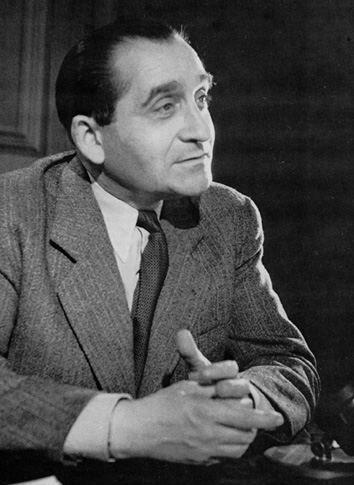
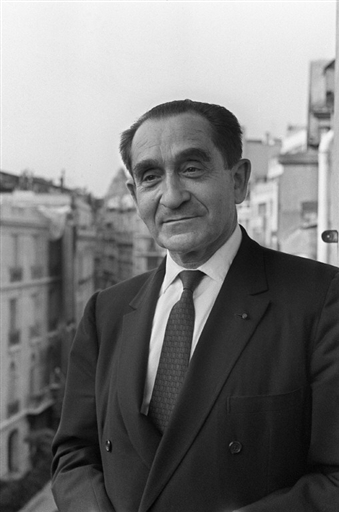
Pierre Mendès France (11 January 1907 – 18 October 1982) was a French politician who served as President of the Council of Ministers (equivalent to Prime Minister) in 1954 - 55. It was under the government of Mendès France that France withdrew its military forces from Vietnam in 1954.
Mendès France was descended from a Portuguese Jewish family that moved to France in the 16th century.
Mendès France was educated at the University of Paris, graduating with a doctorate in law and becoming the youngest member of the Paris Bar association in 1928. In 1924 he joined the Radical Socialist Party, the traditional party of the French middle class center - left (not to be confused with the mainstream socialist party of the time, the SFIO).
In 1932, Mendès France was elected to the National Assembly as a deputy for the Eure département; he was the Assembly's youngest member. His ability was recognized at once, and, in the 1936 Popular Front government of Léon Blum, he was appointed Secretary of State for Finance. When World War II broke out, he joined the French Air Force. After the French surrender to Nazi Germany, he was arrested by the Vichy government authorities and sentenced to six years' imprisonment on a fallacious charge of desertion, but on 21 June 1941, he escaped and succeeded in reaching Britain, where he joined the Free French forces of Charles de Gaulle.
After serving with the Free French Air Force, Mendès France was sent by de Gaulle as his Finance Commissioner in Algeria, and then headed the French delegation to the 1944 monetary conference at Bretton Woods. When de Gaulle returned to liberated Paris in September 1944, he appointed Mendès France as Minister for National Economy in the provisional government.
But Mendès France soon fell out with the Finance Minister, René Pleven, when Mendès France favored state regulation of wages and prices to control inflation (while Pleven favored free market policies). When de Gaulle sided with Pleven, Mendès France resigned. Nonetheless, de Gaulle valued Mendès France's abilities, and appointed him as a director of the International Bank for Reconstruction and Development, and as French representative in the United Nations Economic and Social Council.
In 1947, when normal French politics resumed under the Fourth Republic, Mendès France was re-elected to the National Assembly. He first tried to form a government in June 1953, but was unable to gain the numbers in the Assembly. From 1950 he had been a consistent opponent of French colonialism, and, by 1954, France was becoming hopelessly embroiled in major colonial conflicts: the First Indochina War and the Algerian War of Independence. When French forces were defeated by the Vietnamese Communists at Dien Bien Phu in June 1954, the government of Joseph Laniel resigned, and Mendès France formed a government. Among his ministers was the young François Mitterrand.
Mendès France immediately negotiated an armistice with Ho Chi Minh, the Vietnamese Communist leader. There was, he said, no choice but total withdrawal from Indochina, and the Assembly supported him by 471 votes to 14. Nevertheless, nationalist opinion was shocked, and Roman Catholic opinion opposed abandoning the Vietnamese believers to Communism. A tirade of abuse, much of it anti - Semitic, was directed at Mendès France (Mendès France is a Sephardic Portuguese name.) Jean - Marie Le Pen, then a Poujadist member of the Assembly, described his "patriotic, almost physical repulsion" for Mendès France.
Undeterred, Mendès France next came to an agreement with Habib Bourguiba, the nationalist leader in Tunisia, for the independence of that colony by 1956, and began discussions with the nationalist leaders in Morocco for a French withdrawal. He also favored concessions to the nationalists in Algeria, but the fact that there were a million Pied - noirs there meant that there could be no easy way of out that situation. The future mercenary Bob Denard was convicted in 1954 and sentenced to fourteen months of jail for an assassination attempt against Mendès France.
Mendès France hoped that the Radical Party would become the party of modernization and renewal in French politics, by-passing the SFIO. An advocate of greater European integration, he helped bring about the formation of the Western European Union, and proposed far reaching economic reform. He also favored defense co-operation with other European countries, but the National Assembly rejected the proposal for a European Defense Community, mainly because of misgivings about Germany's participation.
His cabinet fell in February 1955. In 1956 he served as Minister of State in the cabinet headed by the SFIO leader Guy Mollet, but resigned over the issue of Algeria, which was coming to dominate French politics. His split over Algeria with Edgar Faure, leader of the conservative wing of the Radical Party, led to Mendès France resigning as party leader in 1957.
Like most of the French left, Mendès France opposed de Gaulle's seizure of power in May 1958, when the mounting crisis in Algeria brought about a breakdown in the Fourth Republic system and the creation of a Fifth Republic. He led the Union of Democratic Forces, an anti - Gaullist group, but, in the November 1958 elections he lost his seat in the Assembly. In 1959 he was expelled from the Radical Party, whose majority faction supported de Gaulle.
Mendès France then joined the Unified Socialist Party (Parti Socialiste Unifié or PSU), a small party of the intellectual left. He made an unsuccessful bid to regain his seat in the National Assembly representing Eure in the 1962 election.
In 1967, he returned to the Assembly as a PSU member for the Isère, but again lost his seat in de Gaulle's 1968 landslide election victory. In accordance with the PSU, Mendès France expressed sympathy for the sentiments and actions of the student rioters during the "events" (les évènements) of May 1968, a position unusual for a politician of his age and status. In an unorthodox move, de Gaulle's socialist opponent, Gaston Defferre, had designated him Prime Minister elect prior to the election; but to no avail for either. When Mitterrand formed a new Socialist Party in 1971, Mendès France supported him, but did not attempt another political comeback.
Shortly before Mendès France died in 1982, he witnessed the coming to office of Socialist President François Mitterrand.
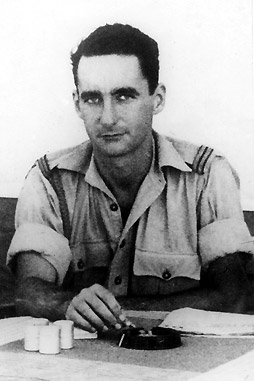
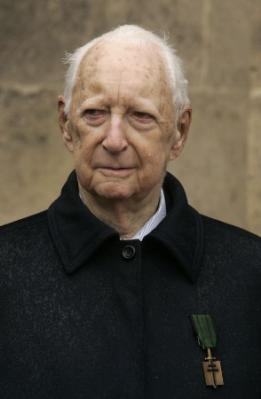
Pierre Joseph Auguste Messmer (20 March 1916 – 29 August 2007) was a French Gaullist politician. He served as Minister of Armies under Charles de Gaulle from 1960 to 1969 – the longest serving since Étienne François, duc de Choiseul under Louis XV – and then as Prime Minister under Georges Pompidou from 1972 to 1974. A member of the French Foreign Legion, he was considered as one of the historical Gaullists, and died aged 91 in the military hospital of the Val - de - Grâce. He was elected a member of the Académie française in 1999.
Pierre Joseph Auguste Messmer was born in Vincennes in 1916. He graduated in 1936 in the language school Institut national des langues et civilisations orientales and the following year at the Ecole nationale de la France d'outre - mer (National School of Oversea France). He then became a senior civil servant in the colonial administration and became a Doctor of Laws in 1939. In the outbreaks of World War II, he was sous - lieutenant of the 12th regiment of Senegalese tirailleurs, and refused France's capitulation after the defeat. He then hijacked in Marseille an Italian cargo, along with Jean Simon, and sailed first to Gibraltar, then London and engaged himself in the Free French Forces as a member of the 13th Brigade of the French Foreign Legion. Messmer then participated to the campaign in Eritrea, in Syria, in Libya, participating to the Battle of Bir Hakeim, and in the Tunisia campaign. He also fought at the Battle of El Alamein in Egypt. He joined in London General Koenig's military staff and participated to the landings in Normandy in August 1944 and the Liberation of Paris.
Named Compagnon de la Libération in 1941, he received the Croix de guerre (War Cross) with six citations after the Liberation, as well as the medal of the Resistance.
After World War II, he returned to the colonies and was a prisoner of war of the Vietminh, during two months in 1945, after the outbreaks of the Indochina War. He was named the following year general secretary of the interministerial committee for Indochina and then head of staff of the high commissary of the Republic.
In the 1950s, he pursued his career in Africa as a colonial administrator. Messmer began his high level African service as governor of Mauritania from 1952 to 1954, and then served as governor of Ivory Coast from 1954 to 1956. He came back to Paris in 1956, in the staff of Gaston Defferre, Minister of Overseas Territories, who enacted the Deferre Act granting to colonial territories internal autonomy, a first step towards independence.
Nominated as governor general of Cameroun in 1956, where a civil war had started the preceding year following the outlawing of the pro - independence Union of the Peoples of Cameroon (UPC) in July 1955. Messmer initiated a decolonization process and imported the counter - revolutionary warfare methods theorized in Indochina and implemented during the Algerian War (1954 – 62). Visiting de Gaulle in Paris, he was implicitly granted his authorization for the new turn implemented to the policies in Cameroon, substituting repression to negotiations with the UPC.
A "Pacification Zone" – the ZOPAC (Zone de pacification du Cameroon) was created on 9 December 1957, encompassing 7,000 square km controlled by seven infantry regiments. Furthermore, a civilian - military intelligence apparatus was created, combining colonial and local staff, assisted by a civilian militia. Mao Zedong's people's war was reversed, in an attempt to separate the civilian population from the guerrilla. In this aim, the local population was rounded up in guarded villages located on the main roads, controlled by the French Army.
He then briefly served as high commissioner of French Equatorial Africa from January 1958 to July 1958, and finally served as high commissioner of French West Africa from 1958 to 1959.
From 1959 to 1969, under Charles de Gaulle's presidency and in the turmoil of the Algerian War, he was Minister of Armies. He confronted the 1961 Generals' Putsch, reorganized the Army and adapted it to the nuclear era.
Along with the Minister of Research, Gaston Palewski, Messmer was present at the Béryl nuclear test in Algeria, on 1 May 1962, during which an accident occurred. Officials, soldiers and Algerian workers escaped as they could, often without wearing any protection. Palewski died in 1984 of leukemia, which he always has attributed to the Beryl incident, while Messmer always remained close - mouthed on the affair.
De Gaulle said of Messmer that, along with Maurice Couve de Murville, he was "one of his two arms." In May '68, he advised de Gaulle against the use of the military.
Messmer became a personality of the Gaullist Party and was elected deputy in 1968, representing Moselle département. A member of the conservative wing of the Gaullist movement, he criticized the "New Society" plan of Prime Minister Jacques Chaban - Delmas, and thus won the trust of Georges Pompidou, elected President in 1969. He quit the government after de Gaulle's resignation and founded the association Présence du gaullisme (Presence of Gaullism).
He occupied cabinet positions again in the 1970s, serving first as Minister of state charged of the Overseas Territories in 1971, then as Prime Minister from July 1972 to May 1974.
He succeeded in this function Jacques Chaban - Delmas, who had adopted a parliamentary reading of the Constitution, which Messmer opposed in his investiture speech. Messmer had been chosen by Pompidou as a guarantor of his fidelity to de Gaulle, and his cabinet included personalities close to Pompidou, such as Jacques Chirac, named Minister of Agriculture.
Due to President Georges Pompidou's illness, he dealt with the everyday administration of the country and adopted a conservative stance opposed to Chaban - Delmas' previous policies. Henceforth, he stopped the liberalization of the ORTF media governmental organization, naming as its CEO Arthur Conte, a personal friend of Pompidou.
Under his government, the Union des Démocrates pour la République (UDR) presidential majority negotiated with Valéry Giscard d'Estaing's Independent Republicans an electoral alliance, which enabled it to win the 1973 elections despite the left wing union realized with the 1972 Common Program. Messmer's second cabinet excluded several Gaullists, among whom Michel Debré, while he named several Independent Republicans members, such as Michel Poniatowski, close to Giscard, himself named Minister of Economy and Finances. A Ministry of Information was also re-created and put under the authority of an ultra conservative, Philippe Malaud. In June 1974, he initiated the construction of 13 nuclear plants in order to confront the "choc pétrolier" (oil crisis).
In 1974, when Pompidou died, those close to Messmer encouraged him to run for president. He accepted at the condition of Chaban - Delmas, Valéry Giscard d'Estaing and Edgar Faure's withdrawals. Faure accepted, as well as Giscard on the condition that Chaban - Delmas also withdrew himself. However, Chaban - Delmas, despite the Canard enchaîné 's campaign against him, maintained himself, leading Messmer to withdraw his candidacy. Finally, Valéry Giscard d'Estaing, a conservative rival of the Gaullists, was elected. He served as prime minister for another few weeks after Pompidou’s death, ending his term after the presidential elections. Jacques Chirac replaced him on 29 May 1974. After the election of Giscard, he never held again ministerial offices, and became one of the historical voices of Gaullism.
He remained however a member of Parliament for the Moselle department until 1988, and served as President of the Lorraine regional assembly from 1968 to 1992. He was mayor of the town of Sarrebourg from 1971 to 1989. Messmer was also president of the Rally for the Republic (RPR) parliamentary group during the first cohabitation (1986 – 1988), under Jacques Chirac' government. In 1997 he testified as a witness during the trial of Maurice Papon, charged of crimes against humanity committed under the Vichy regime, and declared: "The time has come when the Frenchmen could stop hating themselves and begin to grant pardon to themselves.". Along with some other former Resistants, he demanded Papon's pardon in 2001.
He died in 2007 aged 91, just four days after fellow Prime Minister Raymond Barre. He was the last surviving major French Politician to have been a member of the Free French forces.
An important figure of the French Resistance during World War II, Pierre Messmer was a member of the Ordre de la Libération, and the recipient of numerous decorations including the highest rank of the Légion d'honneur. In 2006, he was named Chancellier de l'Ordre de la Libération after the death of General Alain de Boissieu. He was also an officer of the American Legion.
In 1992 he became president of the Institut Charles de Gaulle and, in 1995, of the Fondation Charles de Gaulle.
He also became elected as a member of the Académie française (the French language academy) in 1999, replacing a Gaullist comrade, Maurice Schumann. He was also a member of the French Academy of Moral and Political Sciences since 1988, and, since 1976, of the Académie des sciences d'outre - mer (Academy of Sciences of Overseas Territories). He was named perpetual secretary of the Academy of Moral and Political Sciences in 1995. He was also chancellor of the Institut de France (1998 – 2005) before becoming honorary chancellor.
In October 2001, Messmer succeeded to the General Jean Simon as President of the Fondation de la France libre (Foundation of Free France).
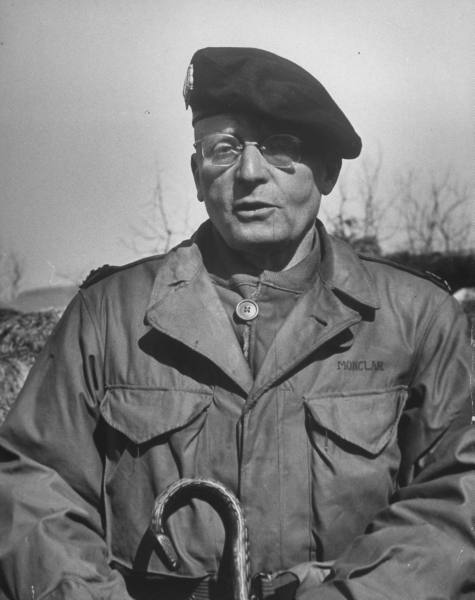
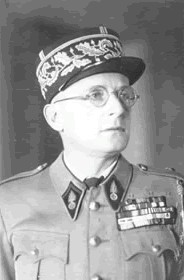
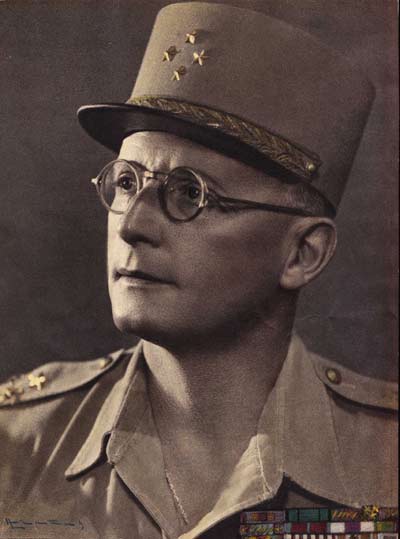
Raoul Charles Magrin - Vernerey (7 February 1892 - 3 June 1964), also known as Ralph Monclar, was a French Army and French Foreign Legion general who fought in World War I, World War II and commanded the French Battalion in the Korean War.
After studying in a seminary, at almost sixteen, he attempted to join the French Foreign Legion, where he was rejected on account of his youth. He entered the École spéciale militaire de Saint - Cyr, where he graduated in 1914 as a sous - lieutenant. He was posted as a junior officer to the 60th infantry regiment, and ended the war as a Capitaine. During the war he was wounded seven times and became a chevalier of the Légion d'honneur, but had more than 90% disability.
Between the wars, he served at various stations throughout French Syria, joining the Legion on March 1, 1924. He was promoted to Major in 1928. In 1931, he was transferred to service in Morocco with the 2nd Foreign Infantry Regiment and followed service there in French Indochina with the 4th Foreign Infantry Regiment. He was promoted to Lieutenant Colonel on 1 June 1938, after commanding a training regiment.
On February 23, 1940, he was appointed to command two battalions of Legionaries, which would shortly be known as the 13th Foreign Legion Demi - Brigade, commanding the 13 DBLE at the Battles of Narvik. After the evacuation of Norway, he spent a little time in France before joining the Free French in London, England, with 500 of his men. He was promoted to Major General during the war. He was also a companion of the Liberation.
Rather than retire, at age 59, Monclar volunteered to join the French forces fighting in Korea. That force was known as the bataillon de Corée, and was attached to the 23rd United States Infantry Regiment as part of the 2nd Infantry Division. Monclar took a temporary demotion from major general to lieutenant colonel in order to command that formation. According to U.S. Army General Matthew Ridgeway:
I shall speak briefly of the 23rd US Infantry Regiment, Colonel Paul L. Freeman commanding, [and] with the French Battalion. Isolated far in advance of the general battle line, completely surrounded in near - zero weather, they repelled repeated assaults by day and night by vastly superior numbers of Chinese. They were finally relieved. I want to say that these American fighting men, with their French comrades - in - arms, measured up in every way to the battle conduct of the finest troops America and France have produced throughout their national existence.